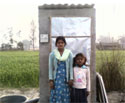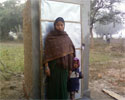 |
 |
 |
Project - Living Earth Institute |
 |
|
Living Earth Institute
www.livingearth.org
See our updated report on the project completion.
 This project is serving 650 households which include almost 4000 individuals. LEI has been working with a local Non-Governmental Organization (NGO), Development Alternative Organization (Bikas Bikalpa Sanstha, BBS), to implement a strong community sanitation program
incorporating training programs, women's micro-lending and income generation programs, and other
elements to ensure project sustainability. So far, BBS has constructed over 300 composting family
latrines. Each family toilet system costs $200 and is built on a cost-sharing basis, under which the
family provides the labor and bears the cost of local construction material (about 50% of the total
cost); the remaining cost is borne by the LEI project.
This project is serving 650 households which include almost 4000 individuals. LEI has been working with a local Non-Governmental Organization (NGO), Development Alternative Organization (Bikas Bikalpa Sanstha, BBS), to implement a strong community sanitation program
incorporating training programs, women's micro-lending and income generation programs, and other
elements to ensure project sustainability. So far, BBS has constructed over 300 composting family
latrines. Each family toilet system costs $200 and is built on a cost-sharing basis, under which the
family provides the labor and bears the cost of local construction material (about 50% of the total
cost); the remaining cost is borne by the LEI project.
The sanitation component involves education on construction, health awareness, and sanitation
practices. The toilet system design creates a fully compostable toilet that is easy to use, culturally
appropriate and ultimately creates a fertilizer for use in farming and gardening. Nepali engineers
hired by LEI originally designed this toilet technology in Nepal. Since there is a solid and well documented
link between sanitation and public health, LEI insists on adequate sanitation prior to
the implementation of clean water project components. We strongly believe that without community
sanitation, there cannot be clean water.
 Working with the local NGOs, such as the BBS in Nepal
exemplifies LEI's approach to engaging with a local organization intimately in order to organize the
community, design the projects, and implement the project components successfully. LEI uses only
local labor and expertise in all elements of the project organization, design and implementation.
This not only makes the work extremely cost effective, but also leave a legacy of trained and
organized components in the community that can provide benefits well beyond the sanitation and
water supply project.
Working with the local NGOs, such as the BBS in Nepal
exemplifies LEI's approach to engaging with a local organization intimately in order to organize the
community, design the projects, and implement the project components successfully. LEI uses only
local labor and expertise in all elements of the project organization, design and implementation.
This not only makes the work extremely cost effective, but also leave a legacy of trained and
organized components in the community that can provide benefits well beyond the sanitation and
water supply project.
|
|
|